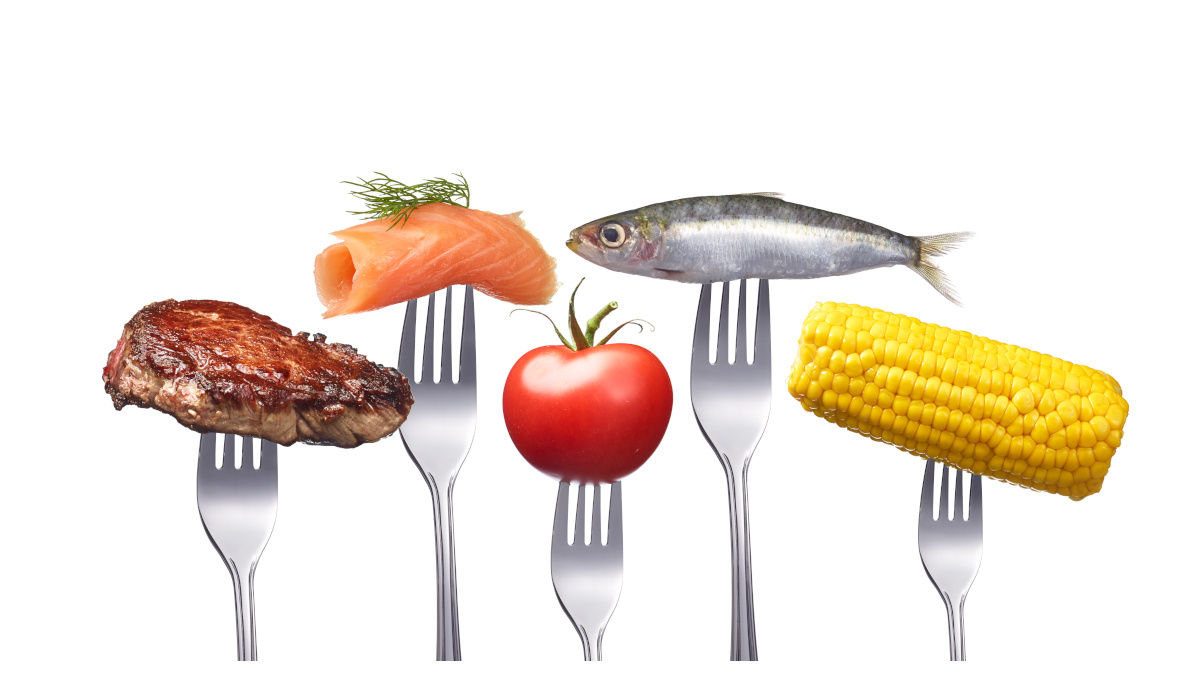Good food combinations: the principle involved and sample menus
What’s the best way of combining foods for optimal digestion and nutritional benefit? Follow these naturopathic recommendations, with our explanations and sample menus.

Food combinations for promoting digestion
Modern Western diets tend to produce significant digestive issues, quite apart from causing potentially serious problems such as diabetes, obesity, cardiovascular disease, etc. (1)
The prevalence of bloating, diarrhoea, flatulence, digestive fatigue, abdominal pain and other digestion-related problems has thus been increasing in Western societies (2).
This is hardly surprising: it’s now widely acknowledged that the ‘average’ diet is much too rich, mixing as it does various types of animal protein (meat and cheese for example), starches, vegetables, sugars and fruit, not to mention fats and alcohol.
Yet the famous Ancient Greek physician, Hippocrates, was talking even then about the importance of not consuming foods that compete with each other during digestion. The principle: to allow each food to be completely digested at mealtimes (3).
Thus to eat well, according to these naturopathic principles, you need to be more aware of where in the body food gets digested. So: (4)
- carbohydrates are generally pre-digested in the mouth, by enzymes in saliva called amylases which break down starch;
- protein is primarily digested in the stomach, an acid environment, by gastric juices;
- fats are processed in the small intestine by bile, which along with gut bacteria, is also involved in extracting nutrients from the food bolus.
The Shelton or disassociated diet
This inventory actually brings us closer to the mechanisms involved in acid-base diets. In fact, one of the founders of the ‘food combining’ approach now promoted by naturopaths was a certain Dr. Shelton, an American 20th century nutritionist who advocated a specific type of diet whereby alkaline foods are never mixed with acid foods within the same meal (5).
In other words, according to Dr. Shelton, you should only ever eatone type of food per meal. This is referred to as a ‘ disassociated diet’ or ‘food combining’ - for example, animal-source protein only, at lunchtime, and then carbohydrates (starches) and vegetables for dinner.
Following this logic but in a less restrictive way, naturopaths have begun to promote diets combining meat and vegetables (following the acid-base balance principle) on the one hand, and starches and vegetables on the other.
The problems with disassociated diets
Dr. Shelton’s diet, like all disassociated diets, was initially created to facilitate weight loss, based on the principle that when foods are consumed independently, they do not lead to weight gain. In effect, disassociated diets are very low-calorie and can therefore help you slim down, while at the same time, reducing digestive discomfort.
However, most nutritionists have mixed feelings about such diets and do not advocate following them for more than 3 months, because of the risk of deficiencies. To help avoid nutritional deficits when practising this food-combining approach, you can take dietary supplements such as our formulation Daily 3, to ensure a good intake of vitamins and minerals.
Some examples of food-combining menus from naturopathy
Naturopaths have therefore taken this disassociated approach and combined it with that of Hippocrates to classify foods into 4 broad groups : (6)
- high protein, including meat, fish, eggs, hard cheese and seafood;
- low protein, including pulses, mushrooms, seaweed, fromage frais, and oilseeds and nuts;
- high starch, including grains (wheat, barley, oats, rice, etc.), pseudo-cereals (quinoa, buckwheat, etc) and their derivatives (pasta, semolina, etc);
- low starch, including potatoes, sweet potatoes, squash (pumpkin, butternut, etc), carrots, chestnuts and cereal flakes, etc.
The idea is thus to avoid mixing two ‘high’ food groups and instead combine a ‘high’ food group with a ‘low’ one, with the aim of facilitating the digestive process and optimising the body’s absorption of nutrients.
So for example, you could combine:
- grilled (or steamed) fish, no added fat, with roasted, diced squash;
- grilled (or steamed chicken), no added fat, with glazed carrots;
- a salad of quinoa, feta, olives and peppers;
- rice (preferably wholegrain), with lentils, carrots, chopped hazelnuts;
- etc.
It’s important to remember, however, that while combining two ‘high’ food groups in the same meal is to be avoided, you should definitely try to consume all food groups across a single day. For example, you could prioritise high protein (animal-source) food at lunchtime for an energy boost, and low starch food at dinnertime for a calming effect to facilitate sleep.
If you are lacto-ovo vegetarian, can digest lactose properly, and want to prioritise plant-based meals, you could complement the day’s meals with one or two scoops of whey to ensure an adequate protein intake (7).
And if despite trying various diets, you still suffer from digestive discomfort, you could also take the supplement Digestive Enzymes which, amongst others, contains fenugreek, known to support digestive health. You could also try a probiotic for its health-beneficial microorganisms (such as the product Probio Forte).
Finally, naturopaths recommend only eating fruit between meals. This is because fruit is normally digested quickly - within 15 to 30 minutes of consumption – but this is not the case when it is mixed into the food bolus from meals, which takes longer to digest.
References
- O'KEEFE JR, James H. et CORDAIN, Loren. Cardiovascular disease resulting from a diet and lifestyle at odds with our Paleolithic genome: how to become a 21st-century hunter-gatherer. In : Mayo Clinic Proceedings. Elsevier, 2004. p. 101-108.
- Price, K.R., Lewis, J., Wyatt, G.M. and Fenwick, G.R. (1988), Review article Flatulence — Causes, relation to diet and remedies. Nahrung, 32: 609-626. https://doi.org/10.1002/food.19880320626
- JOUANNA, Jacques. Dietetics in Hippocratic medicine: definition, main problems, discussion. In : Greek medicine from Hippocrates to Galen. Brill, 2012. p. 137-153.
- https://www.vidal.fr/sante/nutrition/corps-aliments/digestion-aliments.html
- SHELTON, Herbert M. Food combining made easy. Book Publishing Company, 2012.
- VASEY, Christopher. Petit traité de naturopathie. Jouvence Santé, 2013.
- KILARA, A. et VAGHELA, M. N. Whey proteins. In : Proteins in food processing. Woodhead publishing, 2018. p. 93-126.
3 Days
Efficiency and speed
Efficiency and speed
Cuccie
5 Days
GOOD BRAND IN FOOD COMPLEMENTS
GOOD BRAND IN FOOD COMPLEMENTS - SERIOUS WITH GOOD DOCUMENTS AND DETAILS SCIENTIST. AND SERIOUS HONNEST COMMERZIALISATION. I HAVE TRUST IN THEIR PRODUCTS.
FENOGLIO Guy
6 Days
Very good experience
Very good experience, the products arrived in time, in perfect condition and are good quality. Thank you.
GABI TIRCOCI
12 Days
very good expereince
very good expereince
Jelena Đaković
12 Days
Very good products.
Very good products.
Agnes BENDSAK
14 Days
Just OK
Just OK, ordering from company for many years and being safisfied
Lynn Mae
14 Days
Recomendo
Produtos encomendados são recebidos atempadamente e de acordo com o anunciado! Muito satisfeita!
Carla Sofia
15 Days
Everything is great!
Everything is great!
Jonas
20 Days
The delivery was fast and the product…
The delivery was fast and the product is great
SOMMARIVA Gianni
21 Days
Great service and lots of information
Great service and lots of information
Gabi
24 Days
Service Satisfaction
I’m satisfied with the service; it fulfilled what it set out to do.
Anfhony Abreu
27 Days
Original product and fast delivery
Original product and fast delivery. I haven't started it yet, but will do soon.
Vincenza Catania
30 Days
Good quality
Good quality. Good service.
Leonel Guzman
32 Days
Top!!!!!!!!
Top!!!!!!!!
Michael
34 Days
Excellent!
Products are great and delivered fast!
PARDINI Debora
of experience
your money back
##montant## purchase




